Seungone Kim
OptimalThinkingBench: Evaluating Over and Underthinking in LLMs
Aug 18, 2025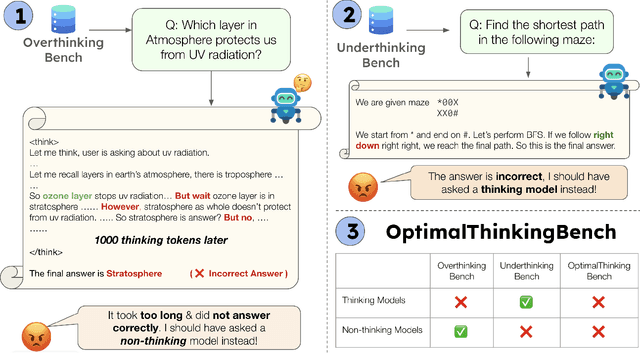
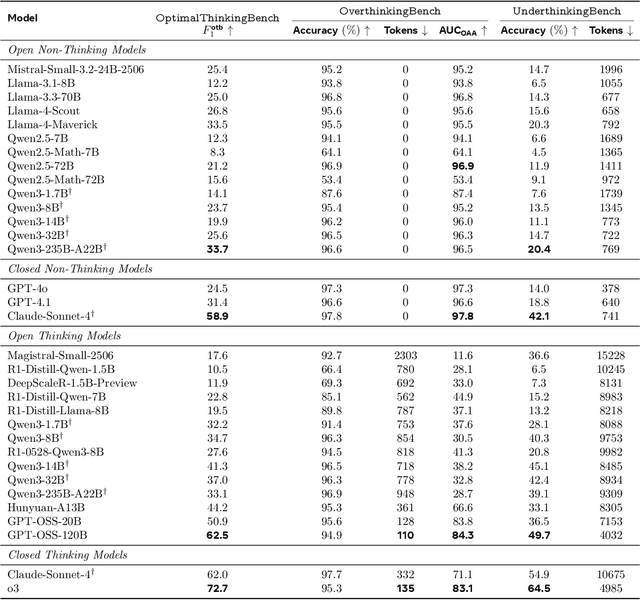

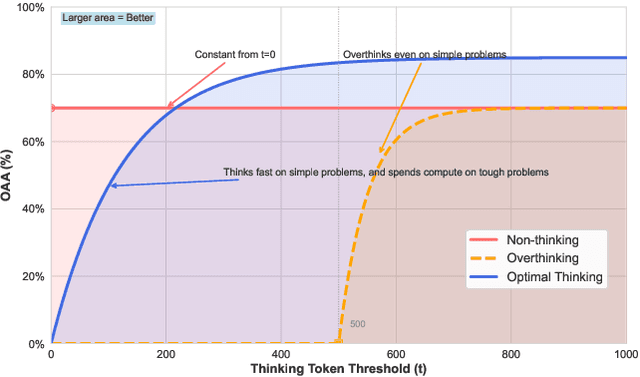
Abstract:Thinking LLMs solve complex tasks at the expense of increased compute and overthinking on simpler problems, while non-thinking LLMs are faster and cheaper but underthink on harder reasoning problems. This has led to the development of separate thinking and non-thinking LLM variants, leaving the onus of selecting the optimal model for each query on the end user. In this work, we introduce OptimalThinkingBench, a unified benchmark that jointly evaluates overthinking and underthinking in LLMs and also encourages the development of optimally-thinking models that balance performance and efficiency. Our benchmark comprises two sub-benchmarks: OverthinkingBench, featuring simple queries in 72 domains, and UnderthinkingBench, containing 11 challenging reasoning tasks. Using novel thinking-adjusted accuracy metrics, we perform extensive evaluation of 33 different thinking and non-thinking models and show that no model is able to optimally think on our benchmark. Thinking models often overthink for hundreds of tokens on the simplest user queries without improving performance. In contrast, large non-thinking models underthink, often falling short of much smaller thinking models. We further explore several methods to encourage optimal thinking, but find that these approaches often improve on one sub-benchmark at the expense of the other, highlighting the need for better unified and optimal models in the future.
Let's Predict Sentence by Sentence
May 28, 2025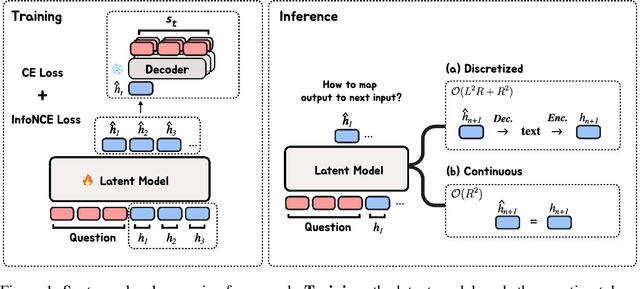


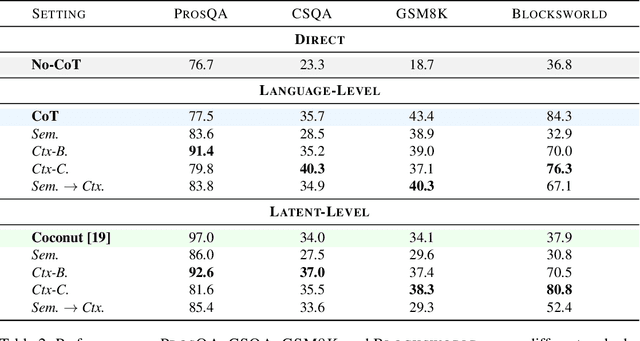
Abstract:Autoregressive language models (LMs) generate one token at a time, yet human reasoning operates over higher-level abstractions - sentences, propositions, and concepts. This contrast raises a central question- Can LMs likewise learn to reason over structured semantic units rather than raw token sequences? In this work, we investigate whether pretrained LMs can be lifted into such abstract reasoning spaces by building on their learned representations. We present a framework that adapts a pretrained token-level LM to operate in sentence space by autoregressively predicting continuous embeddings of next sentences. We explore two embedding paradigms inspired by classical representation learning: 1) semantic embeddings, learned via autoencoding to preserve surface meaning; and 2) contextual embeddings, trained via next-sentence prediction to encode anticipatory structure. We evaluate both under two inference regimes: Discretized, which decodes each predicted embedding into text before re-encoding; and Continuous, which reasons entirely in embedding space for improved efficiency. Across four domains - mathematics, logic, commonsense, and planning - contextual embeddings under continuous inference show competitive performance with Chain-of-Thought (CoT) while reducing inference-time FLOPs on average by half. We also present early signs of scalability and modular adaptation. Finally, to visualize latent trajectories, we introduce SentenceLens, a diagnostic tool that decodes intermediate model states into interpretable sentences. Together, our results indicate that pretrained LMs can effectively transition to abstract, structured reasoning within latent embedding spaces.
Measuring Sycophancy of Language Models in Multi-turn Dialogues
May 28, 2025Abstract:Large Language Models (LLMs) are expected to provide helpful and harmless responses, yet they often exhibit sycophancy--conforming to user beliefs regardless of factual accuracy or ethical soundness. Prior research on sycophancy has primarily focused on single-turn factual correctness, overlooking the dynamics of real-world interactions. In this work, we introduce SYCON Bench, a novel benchmark for evaluating sycophantic behavior in multi-turn, free-form conversational settings. Our benchmark measures how quickly a model conforms to the user (Turn of Flip) and how frequently it shifts its stance under sustained user pressure (Number of Flip). Applying SYCON Bench to 17 LLMs across three real-world scenarios, we find that sycophancy remains a prevalent failure mode. Our analysis shows that alignment tuning amplifies sycophantic behavior, whereas model scaling and reasoning optimization strengthen the model's ability to resist undesirable user views. Reasoning models generally outperform instruction-tuned models but often fail when they over-index on logical exposition instead of directly addressing the user's underlying beliefs. Finally, we evaluate four additional prompting strategies and demonstrate that adopting a third-person perspective reduces sycophancy by up to 63.8% in debate scenario. We release our code and data at https://github.com/JiseungHong/SYCON-Bench.
FREESON: Retriever-Free Retrieval-Augmented Reasoning via Corpus-Traversing MCTS
May 22, 2025Abstract:Large Reasoning Models (LRMs) have demonstrated remarkable capabilities in multi-step reasoning and calling search engines at appropriate steps. However, existing retrieval-augmented reasoning approaches rely on separate retrieval models, limiting the LRM's role in retrieval to deciding when to retrieve and how to query. This separation not only increases hardware and operational costs but also leads to errors in the retrieval process due to the representation bottleneck, a phenomenon where the retriever's embedding space is not expressive enough to meet the generator's requirements. To address this, we shift our perspective from sequence-to-sequence matching to locating the answer-containing paths within the corpus, and propose a novel framework called FREESON (Retriever-FREE Retrieval-Augmented ReaSONing). This framework enables LRMs to retrieve relevant knowledge on their own by acting as both a generator and retriever. To achieve this, we introduce a variant of the MCTS algorithm specialized for the retrieval task, which we call CT-MCTS (Corpus-Traversing Monte Carlo Tree Search). In this algorithm, LRMs traverse through the corpus toward answer-containing regions. Our results on five open-domain QA benchmarks, including single-hop and multi-hop questions, show that FREESON achieves an average improvement of 14.4% in EM and F1 over four multi-step reasoning models with a separate retriever, and it also performs comparably to the strongest baseline, surpassing it by 3% on PopQA and 2WikiMultihopQA.
Web-Shepherd: Advancing PRMs for Reinforcing Web Agents
May 21, 2025
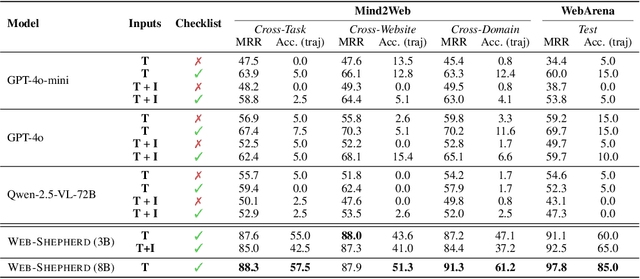
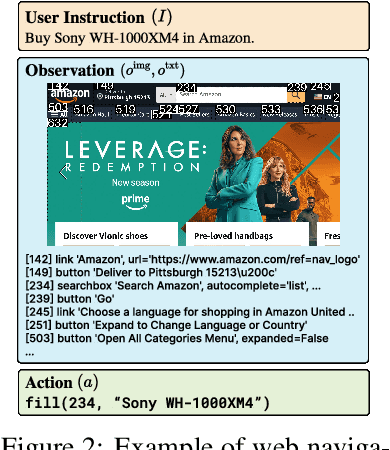

Abstract:Web navigation is a unique domain that can automate many repetitive real-life tasks and is challenging as it requires long-horizon sequential decision making beyond typical multimodal large language model (MLLM) tasks. Yet, specialized reward models for web navigation that can be utilized during both training and test-time have been absent until now. Despite the importance of speed and cost-effectiveness, prior works have utilized MLLMs as reward models, which poses significant constraints for real-world deployment. To address this, in this work, we propose the first process reward model (PRM) called Web-Shepherd which could assess web navigation trajectories in a step-level. To achieve this, we first construct the WebPRM Collection, a large-scale dataset with 40K step-level preference pairs and annotated checklists spanning diverse domains and difficulty levels. Next, we also introduce the WebRewardBench, the first meta-evaluation benchmark for evaluating PRMs. In our experiments, we observe that our Web-Shepherd achieves about 30 points better accuracy compared to using GPT-4o on WebRewardBench. Furthermore, when testing on WebArena-lite by using GPT-4o-mini as the policy and Web-Shepherd as the verifier, we achieve 10.9 points better performance, in 10 less cost compared to using GPT-4o-mini as the verifier. Our model, dataset, and code are publicly available at LINK.
Reasoning Models Better Express Their Confidence
May 20, 2025Abstract:Despite their strengths, large language models (LLMs) often fail to communicate their confidence accurately, making it difficult to assess when they might be wrong and limiting their reliability. In this work, we demonstrate that reasoning models-LLMs that engage in extended chain-of-thought (CoT) reasoning-exhibit superior performance not only in problem-solving but also in accurately expressing their confidence. Specifically, we benchmark six reasoning models across six datasets and find that they achieve strictly better confidence calibration than their non-reasoning counterparts in 33 out of the 36 settings. Our detailed analysis reveals that these gains in calibration stem from the slow thinking behaviors of reasoning models-such as exploring alternative approaches and backtracking-which enable them to adjust their confidence dynamically throughout their CoT, making it progressively more accurate. In particular, we find that reasoning models become increasingly better calibrated as their CoT unfolds, a trend not observed in non-reasoning models. Moreover, removing slow thinking behaviors from the CoT leads to a significant drop in calibration. Lastly, we show that these gains are not exclusive to reasoning models-non-reasoning models also benefit when guided to perform slow thinking via in-context learning.
The CoT Encyclopedia: Analyzing, Predicting, and Controlling how a Reasoning Model will Think
May 15, 2025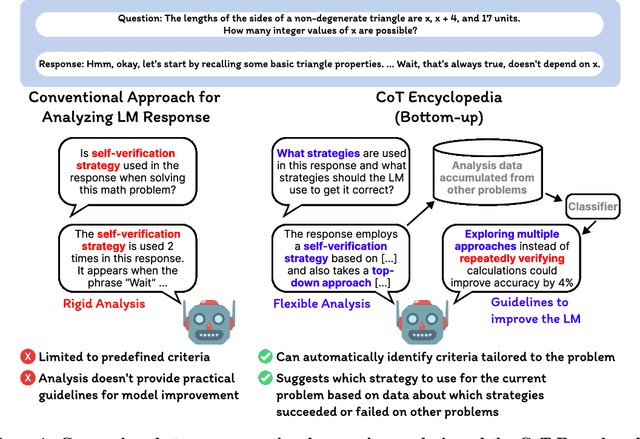
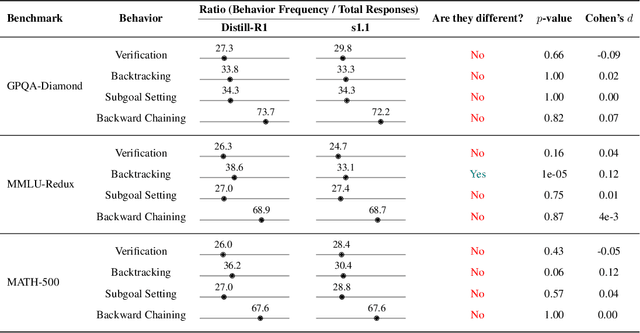
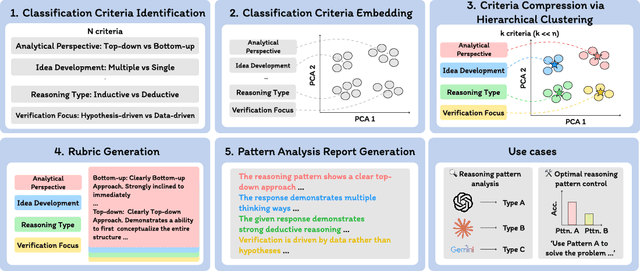
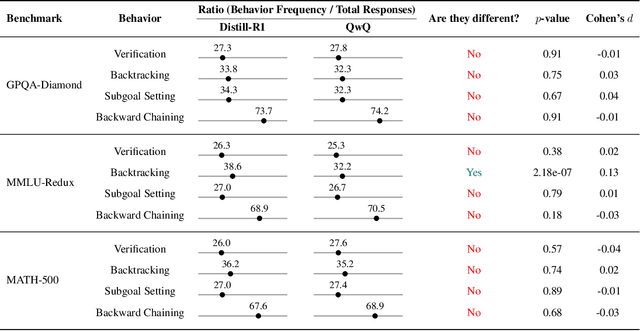
Abstract:Long chain-of-thought (CoT) is an essential ingredient in effective usage of modern large language models, but our understanding of the reasoning strategies underlying these capabilities remains limited. While some prior works have attempted to categorize CoTs using predefined strategy types, such approaches are constrained by human intuition and fail to capture the full diversity of model behaviors. In this work, we introduce the CoT Encyclopedia, a bottom-up framework for analyzing and steering model reasoning. Our method automatically extracts diverse reasoning criteria from model-generated CoTs, embeds them into a semantic space, clusters them into representative categories, and derives contrastive rubrics to interpret reasoning behavior. Human evaluations show that this framework produces more interpretable and comprehensive analyses than existing methods. Moreover, we demonstrate that this understanding enables performance gains: we can predict which strategy a model is likely to use and guide it toward more effective alternatives. Finally, we provide practical insights, such as that training data format (e.g., free-form vs. multiple-choice) has a far greater impact on reasoning behavior than data domain, underscoring the importance of format-aware model design.
M-Prometheus: A Suite of Open Multilingual LLM Judges
Apr 07, 2025Abstract:The use of language models for automatically evaluating long-form text (LLM-as-a-judge) is becoming increasingly common, yet most LLM judges are optimized exclusively for English, with strategies for enhancing their multilingual evaluation capabilities remaining largely unexplored in the current literature. This has created a disparity in the quality of automatic evaluation methods for non-English languages, ultimately hindering the development of models with better multilingual capabilities. To bridge this gap, we introduce M-Prometheus, a suite of open-weight LLM judges ranging from 3B to 14B parameters that can provide both direct assessment and pairwise comparison feedback on multilingual outputs. M-Prometheus models outperform state-of-the-art open LLM judges on multilingual reward benchmarks spanning more than 20 languages, as well as on literary machine translation (MT) evaluation covering 4 language pairs. Furthermore, M-Prometheus models can be leveraged at decoding time to significantly improve generated outputs across all 3 tested languages, showcasing their utility for the development of better multilingual models. Lastly, through extensive ablations, we identify the key factors for obtaining an effective multilingual judge, including backbone model selection and training on natively multilingual feedback data instead of translated data. We release our models, training dataset, and code.
Scaling Evaluation-time Compute with Reasoning Models as Process Evaluators
Mar 25, 2025Abstract:As language model (LM) outputs get more and more natural, it is becoming more difficult than ever to evaluate their quality. Simultaneously, increasing LMs' "thinking" time through scaling test-time compute has proven an effective technique to solve challenging problems in domains such as math and code. This raises a natural question: can an LM's evaluation capability also be improved by spending more test-time compute? To answer this, we investigate employing reasoning models-LMs that natively generate long chain-of-thought reasoning-as evaluators. Specifically, we examine methods to leverage more test-time compute by (1) using reasoning models, and (2) prompting these models to evaluate not only the response as a whole (i.e., outcome evaluation) but also assess each step in the response separately (i.e., process evaluation). In experiments, we observe that the evaluator's performance improves monotonically when generating more reasoning tokens, similar to the trends observed in LM-based generation. Furthermore, we use these more accurate evaluators to rerank multiple generations, and demonstrate that spending more compute at evaluation time can be as effective as using more compute at generation time in improving an LM's problem-solving capability.
Bridging the Data Provenance Gap Across Text, Speech and Video
Dec 19, 2024



Abstract:Progress in AI is driven largely by the scale and quality of training data. Despite this, there is a deficit of empirical analysis examining the attributes of well-established datasets beyond text. In this work we conduct the largest and first-of-its-kind longitudinal audit across modalities--popular text, speech, and video datasets--from their detailed sourcing trends and use restrictions to their geographical and linguistic representation. Our manual analysis covers nearly 4000 public datasets between 1990-2024, spanning 608 languages, 798 sources, 659 organizations, and 67 countries. We find that multimodal machine learning applications have overwhelmingly turned to web-crawled, synthetic, and social media platforms, such as YouTube, for their training sets, eclipsing all other sources since 2019. Secondly, tracing the chain of dataset derivations we find that while less than 33% of datasets are restrictively licensed, over 80% of the source content in widely-used text, speech, and video datasets, carry non-commercial restrictions. Finally, counter to the rising number of languages and geographies represented in public AI training datasets, our audit demonstrates measures of relative geographical and multilingual representation have failed to significantly improve their coverage since 2013. We believe the breadth of our audit enables us to empirically examine trends in data sourcing, restrictions, and Western-centricity at an ecosystem-level, and that visibility into these questions are essential to progress in responsible AI. As a contribution to ongoing improvements in dataset transparency and responsible use, we release our entire multimodal audit, allowing practitioners to trace data provenance across text, speech, and video.
 Add to Chrome
Add to Chrome Add to Firefox
Add to Firefox Add to Edge
Add to Edge